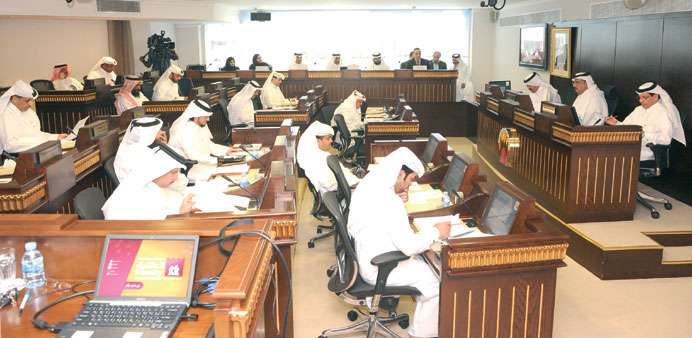CMC members have urged the FCC to play a bigger role in resolving family disputes.
By Ayman Adly /Staff Reporter
Junior Qatari government employees should be given proper accommodation or a suitable housing allowance, members of the Central Municipal Council (CMC) said yesterday.
The issue, raised by CMC member Mohamed al-Shafi at yesterday’s bi-weekly regular session, was acknowledged by all the members present as a highly relevant and important point.
As some Qataris do not have enough resources to rent a house or build one when they marry, they have no option but to live in a room in their family residence with their wives. This, said CMC member Mohamed al-Hajiri, triggered marital discord between the newlyweds. Lack of privacy and parental interference often led to the escalation of small disputes among couples, resulting in divorce and affecting the unity of a family, it was observed.
Al-Hajiri urged the State to encourage young people to marry by granting them adequate private accommodation, especially for junior government employees.
CMC chairman Jassim al-Malki said the government provides accommodation or equivalent financial allowance to foreign employees across all categories. Junior Qatari employees should enjoy similar privileges.
Al-Shafi praised the efforts of the country in this regard and sought further implementation of the initiative to support citizens.
Rashid al-Dosari, director-general of Family Consulting Centre, who attended the session with other senior FCC officials, praised the efforts of the CMC in promoting the wellbeing of Qatari families. He said such suggestions on housing would help ensure stability in families.
Al-Dosari gave a presentation on the FCC, its tasks, duties and how it functions. “We seek to build a long-term strategic and pioneering social partnership with the council to achieve our mission of ensuring family stability and solidarity,” he said, stressing that the centre promotes positive relationships among couples so as to decrease the divorce rate and help families resolve differences amicably.
Since its establishment in 2002, the FCC has gained the trust of its clients through the professionalism of its staff and policy of confidentiality in dealing with their issues. For instance, up to 2012, the centre conducted 14,598 telephonic family consultations, 28,135 consultations and received more than 72,000 related cases.
In 2012, the FCC provided friendly consultation services for 1,514 cases, 847 of which were resolved. Almost 42% of the cases referred to it by the courts - from its inauguration till 2011 - were resolved in a friendly manner. Also, it received 2,248 cases transferred from the courts, including through court executive orders. It managed to resolve 653 of these cases. Last year, the centre offered 3,360 related consultations.
Al-Dosari stressed that the FCC was trying to reach out to families and target users through all possible means, especially the Internet and the social media. The centre is active on Twitter, Facebook and YouTube, among others.
However, a considerable number of CMC members said the centre should have more branches, adequately distributed across the country. There should also be better co-operation with CMC members so as to reach out to families in their respective areas.
CMC member Dr Mohamed al-Mesalamani stressed that the centre should play a more active role in encouraging the reconstruction of “broken households” through efforts to get divorced women and widows remarried. Other members said the FCC should ensure better co-ordination with the clergy and Community Policing Department to address related issues.
Al-Dosari said there is a plan to open more branches in the said areas, adding that proper co-ordination already exists. He stressed that material disputes played a big role in family disputes in societies with high standards of living, adding that this factor should be taken into consideration as well.

